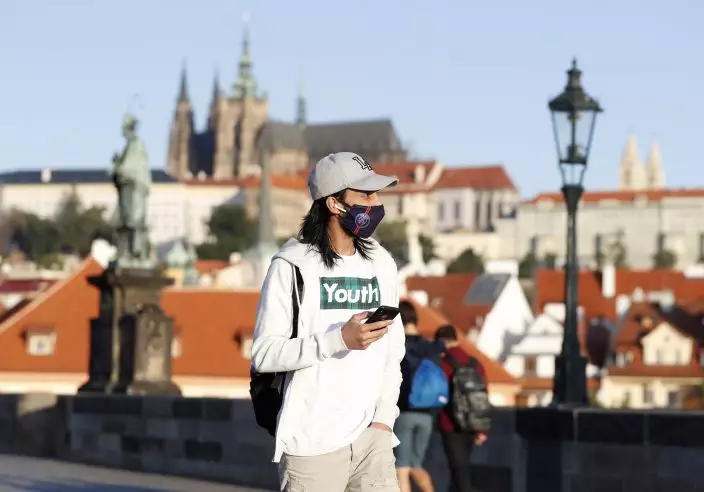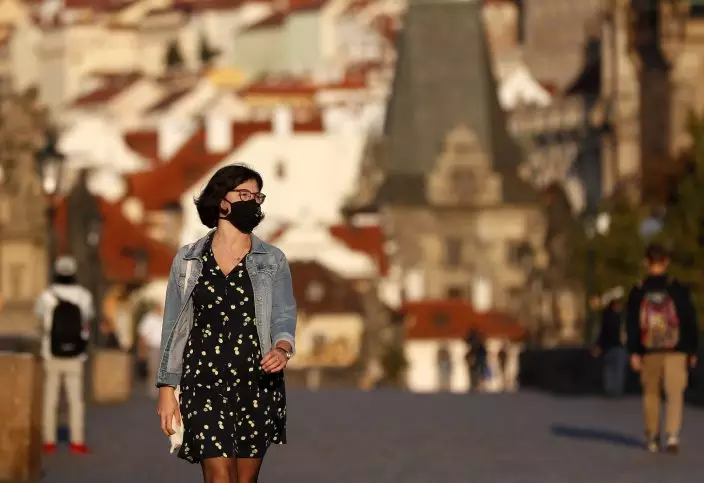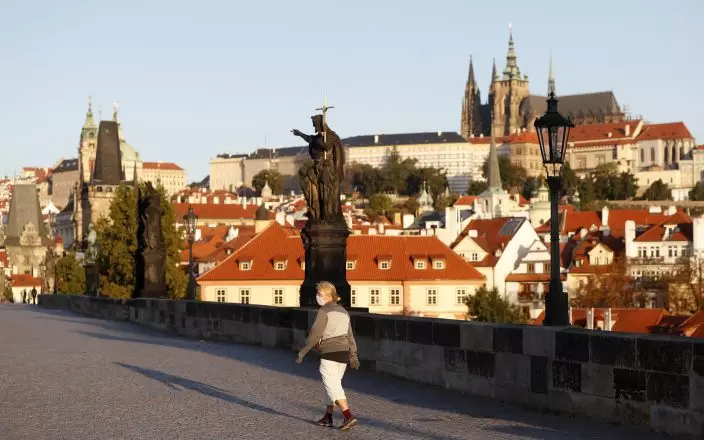Hungary’s prime minister said Friday that the government has drawn up a “war plan” to defend against the new wave of the coronavirus pandemic and that the country’s health care system is prepared to handle to rising number of new virus cases.
Prime Minister Viktor Orban said on state radio that while everyone was asked to stay home during the first wave of the pandemic, the preparedness of hospitals and sufficient ventilators now made it possible for the country to keep functioning while respecting strict rules about wearing masks and social distancing.
“During the first wave, all we could say was that everyone should stay at home and meanwhile we’ll get the health system ready,” Orban said. “Now the task is not for everyone to stay at home but, on the contrary, for everyone to keep living on their lives.”

A young man wearing a face mask walks across the medieval Charles Bridge in Prague, Czech Republic, Friday, Sept. 18, 2020. The Czech Republic has been been facing the second wave of infections. The number of new confirmed coronavirus infections has been setting new records almost on a daily basis, currently surpassing 3,000 cases in one day for the first time. (AP PhotoPetr David Josek)
“The country has to function, but it has to function while at the same time it protects itself against the virus in a disciplined manner and following the rules.”
Hungary, Romania, the Czech Republic and Slovakia have all announced a record number of new cases this week.
The steepest spike in the region was in the Czech Republic, which announced 3,130 new cases on Friday. That was almost 1,000 more than the previous record, set a day earlier. Slovakia also set a new daily record of 235, breaking the Sept. 4 mark of 226. In Romania, the record was set Wednesday, with 1,713 new cases and the daily tally has since remained above 1,500.

A young woman wearing a face mask walks across the medieval Charles Bridge in Prague, Czech Republic, Friday, Sept. 18, 2020. The Czech Republic has been been facing the second wave of infections. The number of new confirmed coronavirus infections has been setting new records almost on a daily basis, currently surpassing 3,000 cases in one day for the first time. (AP PhotoPetr David Josek)
Early Friday, Orban visited the Korányi National Pulmonological Institute. In a video of the visit posted on his Facebook page, a doctor could he heard telling the prime minister that the hospital was nearing its capacity to take in coronavirus cases — it was treating around 40 patients and had 12 beds left — and while it had enough ventilators, the problem was more about the need for specialists to operate the machines.
Hungary announced 941 new cases of COVID-19 on Friday, for a total of 16,111 cases since the start of the pandemic, with 669 deaths. Of the infected, 374 people were being treated in hospital and 29 were on ventilators.
Over the last several days, Hungary has extended the mandatory wearing of masks — already necessary on public transportation and shops — to theaters, cinemas, health care and social institutions, among others. Fines have also been put in place for people not wearing masks or wearing them incorrectly.

A woman wearing a face mask walks across the medieval Charles Bridge in Prague, Czech Republic, Friday, Sept. 18, 2020. The Czech Republic has been been facing the second wave of infections. The number of new confirmed coronavirus infections has been setting new records almost on a daily basis, currently surpassing 3,000 cases in one day for the first time. (AP PhotoPetr David Josek)
Orban, who had a phone conversation with President Trump last week, said the U.S. leader told him that “by the end of October or, at the latest, by the end of the year, there will an American vaccine.”
Orban said Trump also said that Hungary would have access to the vaccine, “but we’ll believe it if it happens.”
"As long as there’s no vaccine, protection (against the virus) will continue,” Orban concluded.
The Hungarian government has also set a maximum price of around $65 for coronavirus tests, which has led some private-sector laboratories healthcare providers to abandon providing the service.
According to business news site napi.hu, the maximum price for tests — compared to the average market price of around $105 — at best allows labs to break even while at the same time it is still too high for the average Hungarian family.
Associated Press Writer Karel Janicek in Prague contributed to this report.


